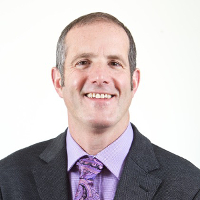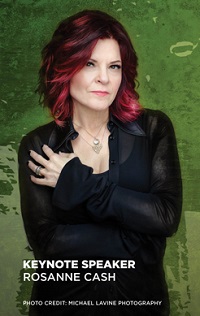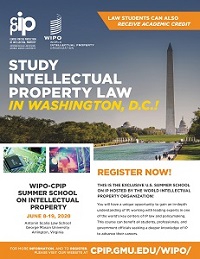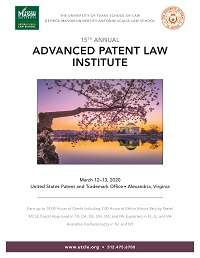Greetings from CPIP Executive Director Sean O’Connor

Happy Leap Day! The extra day here in February has allowed us to be extra productive here at CPIP. For example, I am in Jakarta, Indonesia speaking on multiple panels at the Second IP & Innovation Researchers of Asia Conference as part of our international initiative. On Tuesday, we launch our partnership with Biz Launch at Arlington Economic Development, Mason Law Clinic @ BizLaunch. As mentioned in last month’s Roundup, BizLaunch and Mason will co-host this series of lectures and clinical sessions to assist local entrepreneurs with legal issues they confront as they bring their ideas to life.
I’d like to commend CPIP Director of Copyright Research and Policy Sandra Aistars for amazing impact in the policy world this past month. On February 3, she spoke on a panel titled “AI and the Visual Arts” during Copyright in the Age of Artificial Intelligence, a symposium hosted by the U.S. Copyright Office and the World Intellectual Property Organization. Then, along with CPIP Senior Scholar Mark Schultz, Sandra participated in a February 11 hearing before the Senate Subcommittee on Intellectual Property: The Digital Millennium Copyright Act at 22: What Is It, Why Was it Enacted, and Where Are We Now?. We are proud of both Sandra and Mark for their articulate testimony during this timely and important DMCA review process. Sandra also filed an amicus brief in Google v. Oracle this month, working hard over a holiday weekend to send it out on time. Thank you, as well, to our fellow scholars who signed their names to the brief!
This past Thursday, we were proud to host Professor Kara Swanson, Northeastern University School of Law, who led Scalia Law School faculty and students in a scholarly discussion on her upcoming article, “Race and Selective Memory: Reflections on Invention of a Slave.” This was a collaboration with our partners at the Institute for Intellectual Property & Social Justice who brought Professor Swanson to the DMV for their Seventeenth Annual IP and Social Justice CLE Seminar at Howard University.
Looking ahead, please save the date for Sandra’s fireside chat with Grammy-winning musician, composer, and jazz orchestra leader Maria Schneider on April 9 at Scalia Law School in Arlington. They will discuss art and the music business, as well as the legal issues confronting independent artists. Art & Entertainment Advocacy Clinic law students will also be present at this event to help any attending independent artists with entertainment law and copyright issues. Then, on April 15, WIPO Chief Economist Carsten Fink will visit Scalia Law School to present the 2019 World Intellectual Property Report as a co-sponsored event between WIPO and CPIP. We appreciate the efforts and participation of USPTO’s Office of the Chief Economist in making this event possible. More details are to come for both events.
This week, we announced the full line-up of speakers for CPIP’s music law conference, The Evolving Music Ecosystem, which will take place at Scalia Law School in Arlington on April 23-24! We appreciate the opportunity to host this incredible lineup of artists, academics, and industry leaders, and I encourage you to take a look at the event’s website and register today.
Finally, registration has opened for the WIPO-CPIP Summer School on Intellectual Property, which will be hosted at Scalia Law School for the third year in a row. This year’s dates are June 8-19, and we look forward to another excellent turnout of both U.S. and international students.
I look forward to seeing you at some of CPIP’s exciting events in the near future.
Speakers Announced for Music Law Conference with Rosanne Cash on April 23-24, 2020

We have announced the speakers for CPIP’s music law conference, The Evolving Music Ecosystem, which will be held at Antonin Scalia Law School in Arlington, Virginia, on April 23-24, 2020. The keynote address will be given by Rosanne Cash, and it features two days of panel presentations from leading experts.
This unique conference continues a dialogue on the music ecosystem begun by CPIP Executive Director Sean O’Connor while at the University of Washington School of Law in Seattle. In its inaugural year in the D.C. area, the conference aims to bring together musicians, music fans, lawyers, artist advocates, business leaders, government policymakers, and anyone interested in supporting thriving music ecosystems in the U.S. and beyond.
Please click here to register, and click here to visit our conference website.
Registration Open for WIPO-CPIP Summer School on IP on June 8-19, 2020

CPIP has again partnered with the World Intellectual Property Organization (WIPO) to host the third iteration of the WIPO-CPIP Summer School on Intellectual Property at Antonin Scalia Law School in Arlington, Virginia, on June 8-19. Registration is now open, and we recommend that participants apply early, as we expect the program to be full.
The course provides a unique opportunity for students, professionals, and government officials to work with leading experts to gain a deeper knowledge of IP to advance their careers. The course consists of lectures, case studies, simulation exercises, group discussions, and panel discussions on selected IP topics, with an orientation towards the interface between IP and other disciplines.
Please click here for more information.
Early Registration Extended for Advanced Patent Law Institute on March 12-13, 2020

Antonin Scalia Law School and the University of Texas School of Law are presenting the 15th Annual Advanced Patent Law Institute at the U.S. Patent and Trademark Office (USPTO) in Alexandria, Virginia, on March 12-13. This conference offers a unique opportunity to join USPTO senior staff, leading practitioners, academics, and members of the federal judiciary for two days of presentations on the latest developments in patent law.
CPIP Director of Communications Devlin Hartline will be the Presiding Officer on the afternoon of March 12, where he will introduce Under Secretary of Commerce for Intellectual Property and Director of the USPTO Andrei Iancu, among others.
The early registration discount has been extended to March 4. For more information about the conference and to register, please click here.
Spotlight on Scholarship

Erika Lietzan, The ‘Evergreening’ Metaphor in Intellectual Property Scholarship, ___ Akron L. Rev. ___ (forthcoming)
In this paper that will be published in the Akron Law Review, CPIP Senior Fellow for Life Sciences Erika Lietzan takes a deep dive into the scholarly dialogue about so-called “evergreening” by drug companies. Prof. Lietzan canvasses 342 journal articles from legal, medical, scientific, and economic fields and finds that, while the metaphorical term “evergreening” is not used consistently, its use can be boiled down to the normative claim that drug innovators should not be able to enjoy an exclusive market for innovations that stem from a separate innovation. Prof. Lietzan argues that policymaking should be based on descriptive, empirical scholarship, and the use of “evergreening” obscures the fact that we do not have such studies today.
Jonathan Barnett & Ted M. Sichelman, The Case for Noncompetes, ___ U. Chi. L. Rev. ___ (2020)
In this paper that will be published in the University of Chicago Law Review, CPIP Senior Fellow for Innovation Policy Jonathan Barnett and CPIP Senior Scholar Ted Sichelman take on the common argument that noncompete agreements deter innovation. They note that recent steps by legislators to limit the enforcement of noncompetes are not based on sound theory or empirics. On theory, they note that the positive effect of noncompetes in encouraging firms to make investments in intellectual and human capital is overlooked. And on empirics, they demonstrate that the two main bodies of evidence cited do not in fact support the nonenforcement of noncompetes. Given these complexities, Profs. Barnett and Sichelman suggest an error-cost approach to provide an economic rationale for the reasonableness standard of assessing such provisions found in the common law.
Activities, News, & Events

CPIP Director of Copyright Research and Policy Sandra Aistars and CPIP Senior Scholar Mark Schultz testified before Senate Subcommittee on Intellectual Property about the problems with the Digital Millennium Copyright Act (DMCA). The hearing, entitled The Digital Millennium Copyright Act at 22: What Is It, Why Was it Enacted, and Where Are We Now?, is the first of ten such hearings that will evaluate the continued relevance of the DMCA. The Subcommittee is chaired by Senator Thom Tillis, and he has indicated that the DMCA has not “stood the test of time” and that he intends to “craft new legislation to modernize the DMCA for today’s internet.” Video from the hearing is available here, and you can download Prof. Aistars’ testimony here and Prof. Schultz’s testimony here. The hearing has been featured in several news articles, including at IPWatchdog, Law360, TorrentFreak, The Verge, and The Buchtelite.
CPIP Director of Copyright Research and Policy Sandra Aistars filed an amicus brief in the Google v. Oracle case that is currently before the U.S. Supreme Court. The brief was joined by eight other copyright scholars, including Stephen Carlisle, Jon Garon, Hugh Hansen, Devlin Hartline, Adam Mossoff, Chris Newman, Sean O’Connor, and Mark Schultz. The brief argues: “Google’s position is not only contrary to the statute—it would actively discourage innovation by original authors with knowledge that their work can be exploited without due compensation. It also would discourage intermediary business models built around generating, promoting, monetizing, and publishing original works of authorship, e.g., publishing houses. This is not what the Constitution had in mind.”
CPIP Senior Scholar Kristen Osenga has been busy this month. Prof. Osenga joined F. Scott Kieff for a Federalist Society teleforum entitled Litigation Update: FTC v. Qualcomm, which recapped the district court’s decision and discussed the arguments that were likely to be made in Qualcomm’s appeal to the Ninth Circuit in its antitrust litigation with the Federal Trade Commission. She also drafted a post at IPWatchdog detailing the oral argument before the Ninth Circuit. Prof. Osenga participated in a Federalist Society Regulatory Transparency Report Podcast entitled The New DOJ-USPTO-NIST Policy Statement on Remedies for Infringement of Standard-Essential Patents, which was moderated by Adam Mossoff. And she was featured in a recent article at Richmond Law, where she discussed her transition from engineering to patent law.